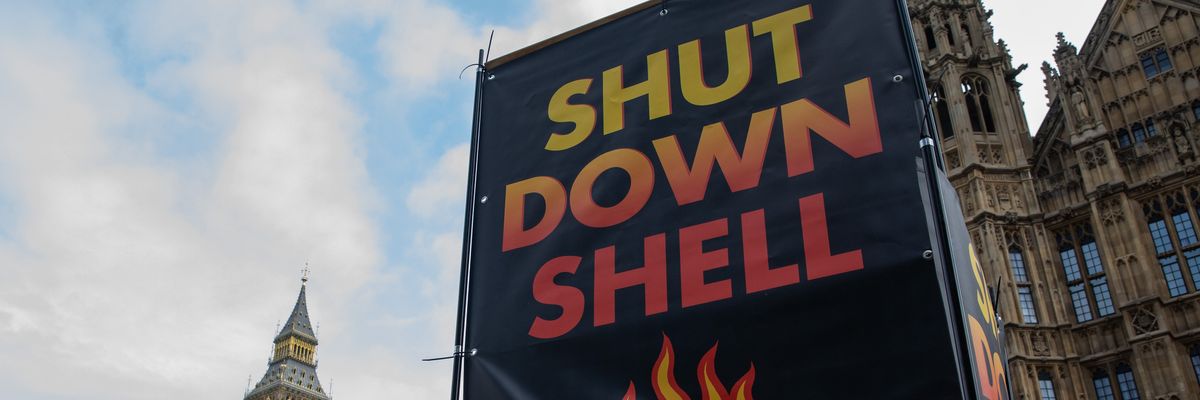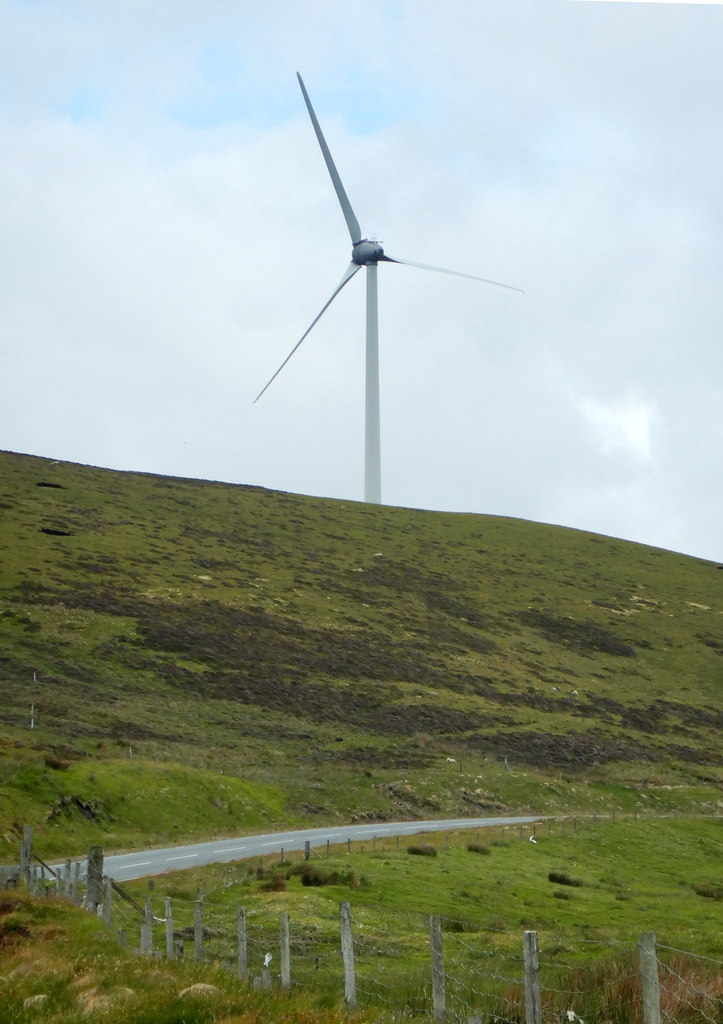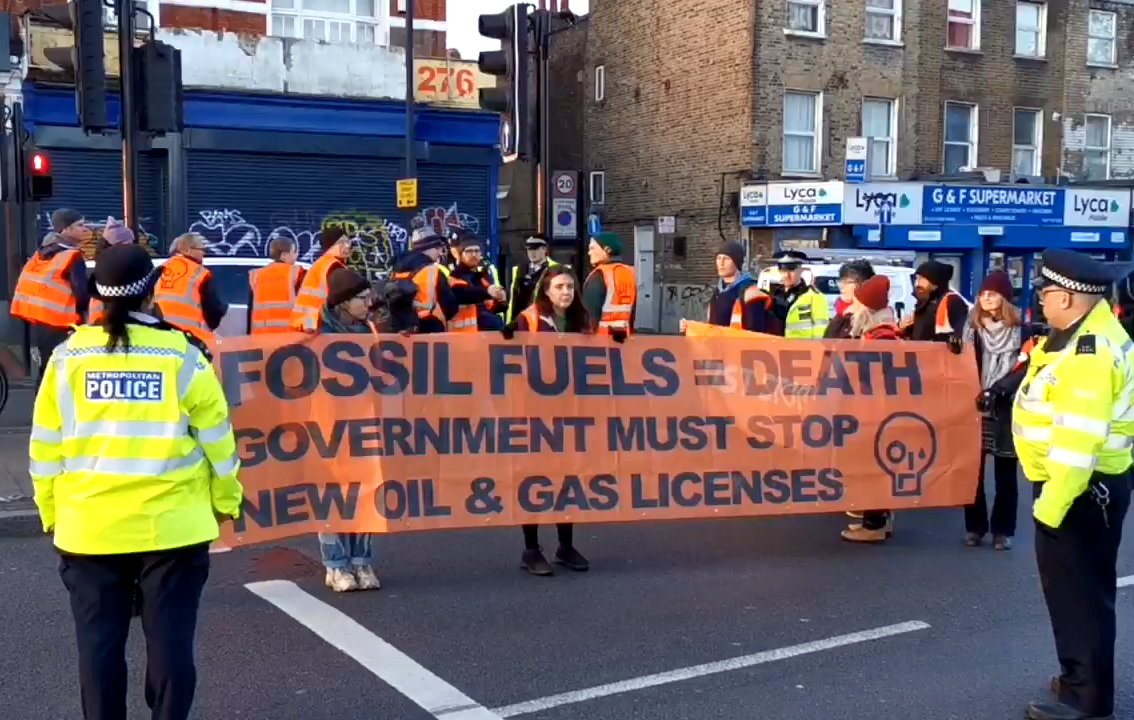Campaigners Rip Shell CEO’s ‘Cynical Case’ Against Ditching Fossil Fuels
Original article by JULIA CONLEY republished from Common Dreams under Creative Commons (CC BY-NC-ND 3.0).

A large display from the environmental group Fossil Free London is seen during a climate protest in London on April 24, 2023. (Photo: Mark Kerrison/In Pictures via Getty Images)
“The only ‘danger’ Shell would see in cutting production is to their eye-watering profits,” said one campaigner.
Two days after scientists recorded the hottest day on record and warned that the milestone is the latest clear sign that all fossil fuel production must be urgently phased out, the CEO of multinational oil and gas giant Shell claimed that transitioning to renewable energy sources is what would endanger the world and expressed what campaigners called “cynical” concerns for the well-being of the Global South.
Wael Sawan, who took over the U.K.-based company last year, told the BBC Thursday that the world’s energy system “continues to desperately need oil and gas,” contrary to evidence put forward by the International Energy Agency, the Intergovernmental Panel on Climate Change, United Nations Secretary-General António Guterres, and other experts.
“I think what would be dangerous and irresponsible is actually cutting out the oil and gas production so that the cost of living—as we saw just last year—starts to shoot up again,” said Sawan.
Cost-of-living increases have raised alarm in communities around the world following the coronavirus pandemic and Russia’s invasion of Ukraine—but numerous analyses have pointed to corporate greed and price-gouging, not the decreasing supply of oil and gas, as primary drivers of financial hardship for working people.
Shell reported record-breaking profits of nearly $40 billion last year, doubling its total for 2021.
“The only ‘danger’ Shell would see in cutting production is to their eye-watering profits,” Alice Harrison of the international human rights group Global Witness told The Guardian Thursday. “Whether blinded by the pound signs or simply willfully ignorant, Shell’s CEO is wrong. Ending our dependence on fossil fuels and transitioning to green energy will serve both the planet and provide energy security for all. Shell [has] once again made their loyalties clear—profit over people and planet.”
Guterres is among the critics who have warned that companies that continue to invest in fossil fuels will not continue to see enormous profits forever, and as Common Dreams reported last week, research from the University of Waterloo in Canada found that public pensions in the United States have lost tens of billions of dollars due to their refusal to pull out of the oil, gas, and coal sectors.
“Investing in new fossil fuels infrastructure is moral and economic madness,” Guterres said earlier this year. “Such investments will soon be stranded assets—a blot on the landscape and a blight on investment portfolios.”
In his comments to the BBC, Sawan suggested his concern is not with his own company’s future, but that of the Global South—where people are suffering disproportionately from the effects of the climate crisis and planetary heating, despite causing a tiny fraction of the fossil fuel pollution that originates in wealthier countries.
He said the distribution of benefits from the use of renewable energy must be “globally responsible” so the Global North doesn’t hoard energy sources such as solar and wind power.
“Let’s be clear, companies like Shell are fueling both the climate crisis and the soaring cost of energy,” Jamie Peters of Friends of the EarthtoldThe Guardian. “They are profiting from the misery of ordinary people while destroying the planet, and they’re making a cynical case to continue locking us into the volatile fossil fuel markets that are the root cause of the energy crisis.”
As environmental journalist Harry Cockburn noted on social media, for all Sawan’s claims of concern for people in the Global South, he made clear that Shell’s profits are his top priority as the interview concluded.
“Cutting production is only dangerous in the kind of upside-down world where profit rules over everything,” said the grassroots coalition Stop Cambo, which pressured Shell to pull out of the Cambo oil field off the coast of Scotland in 2021. “Even as the planet burns and people are forced to choose between heating and eating.”
Original article by JULIA CONLEY republished from Common Dreams under Creative Commons (CC BY-NC-ND 3.0).



